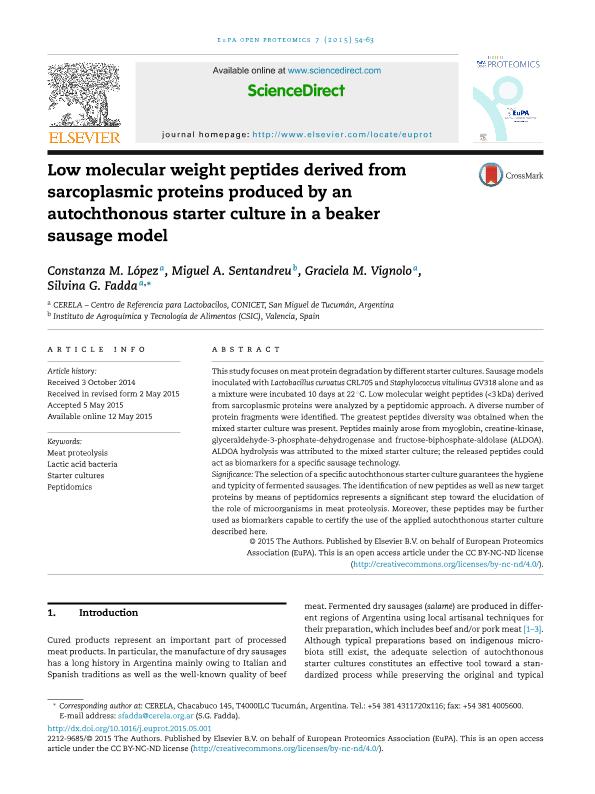Mostrar el registro sencillo del ítem
dc.contributor.author
López, Constanza María

dc.contributor.author
Sentandreu, Miguel Angel
dc.contributor.author
Vignolo, Graciela Margarita

dc.contributor.author
Fadda, Silvina G.

dc.date.available
2017-11-21T15:01:40Z
dc.date.issued
2015-05-12
dc.identifier.citation
López, Constanza María; Sentandreu, Miguel Angel; Vignolo, Graciela Margarita; Fadda, Silvina G.; Low molecular weight peptides derived from sarcoplasmic proteins produced by an autochthonous starter culture in a beaker sausage model; Elsevier; EuPA Open Proteomics; 7; 12-5-2015; 53-63
dc.identifier.issn
2212-9685
dc.identifier.uri
http://hdl.handle.net/11336/28595
dc.description.abstract
This study focuses on meat protein degradation by different starter cultures. Sausage modelsinoculated with Lactobacillus curvatus CRL705 and Staphylococcus vitulinus GV318 alone and asa mixture were incubated 10 days at 22◦C. Low molecular weight peptides (<3 kDa) derivedfrom sarcoplasmic proteins were analyzed by a peptidomic approach. A diverse number ofprotein fragments were identified. The greatest peptides diversity was obtained when themixed starter culture was present. Peptides mainly arose from myoglobin, creatine-kinase,glyceraldehyde-3-phosphate-dehydrogenase and fructose-biphosphate-aldolase (ALDOA).ALDOA hydrolysis was attributed to the mixed starter culture; the released peptides couldact as biomarkers for a specific sausage technology.Significance: The selection of a specific autochthonous starter culture guarantees the hygieneand typicity of fermented sausages. The identification of new peptides as well as new targetproteins by means of peptidomics represents a significant step toward the elucidation ofthe role of microorganisms in meat proteolysis. Moreover, these peptides may be furtherused as biomarkers capable to certify the use of the applied autochthonous starter culturedescribed here.
dc.format
application/pdf
dc.language.iso
eng
dc.publisher
Elsevier

dc.rights
info:eu-repo/semantics/openAccess
dc.rights
Atribución-NoComercial-CompartirIgual 2.5 Argentina (CC BY-NC-SA 2.5 AR)
dc.rights.uri
https://creativecommons.org/licenses/by-nc-nd/2.5/ar/
dc.subject
Meat Proteolysis
dc.subject
Lactic Acid Bacteria
dc.subject
Starter Cultures
dc.subject
Peptidomics
dc.subject.classification
Alimentos y Bebidas

dc.subject.classification
Otras Ingenierías y Tecnologías

dc.subject.classification
INGENIERÍAS Y TECNOLOGÍAS

dc.title
Low molecular weight peptides derived from sarcoplasmic proteins produced by an autochthonous starter culture in a beaker sausage model
dc.type
info:eu-repo/semantics/article
dc.type
info:ar-repo/semantics/artículo
dc.type
info:eu-repo/semantics/publishedVersion
dc.date.updated
2017-07-17T13:49:37Z
dc.identifier.eissn
2212-9685
dc.journal.volume
7
dc.journal.pagination
53-63
dc.journal.pais
Países Bajos

dc.journal.ciudad
Amsterdam
dc.description.fil
Fil: López, Constanza María. Consejo Nacional de Investigaciones Científicas y Técnicas. Centro Científico Tecnológico Conicet - Tucuman. Centro de Referencia Para Lactobacilos; Argentina
dc.description.fil
Fil: Sentandreu, Miguel Angel. Consejo Superior de Investigaciones Científicas. Instituto de Agroquímica y Tecnología de Alimentos; España
dc.description.fil
Fil: Vignolo, Graciela Margarita. Consejo Nacional de Investigaciones Científicas y Técnicas. Centro Científico Tecnológico Conicet - Tucuman. Centro de Referencia Para Lactobacilos; Argentina
dc.description.fil
Fil: Fadda, Silvina G.. Consejo Nacional de Investigaciones Científicas y Técnicas. Centro Científico Tecnológico Conicet - Tucuman. Centro de Referencia Para Lactobacilos; Argentina
dc.journal.title
EuPA Open Proteomics
dc.relation.alternativeid
info:eu-repo/semantics/altIdentifier/doi/https://doi.org/10.1016/j.euprot.2015.05.001
dc.relation.alternativeid
info:eu-repo/semantics/altIdentifier/url/http://www.sciencedirect.com/science/article/pii/S2212968515000136
Archivos asociados
